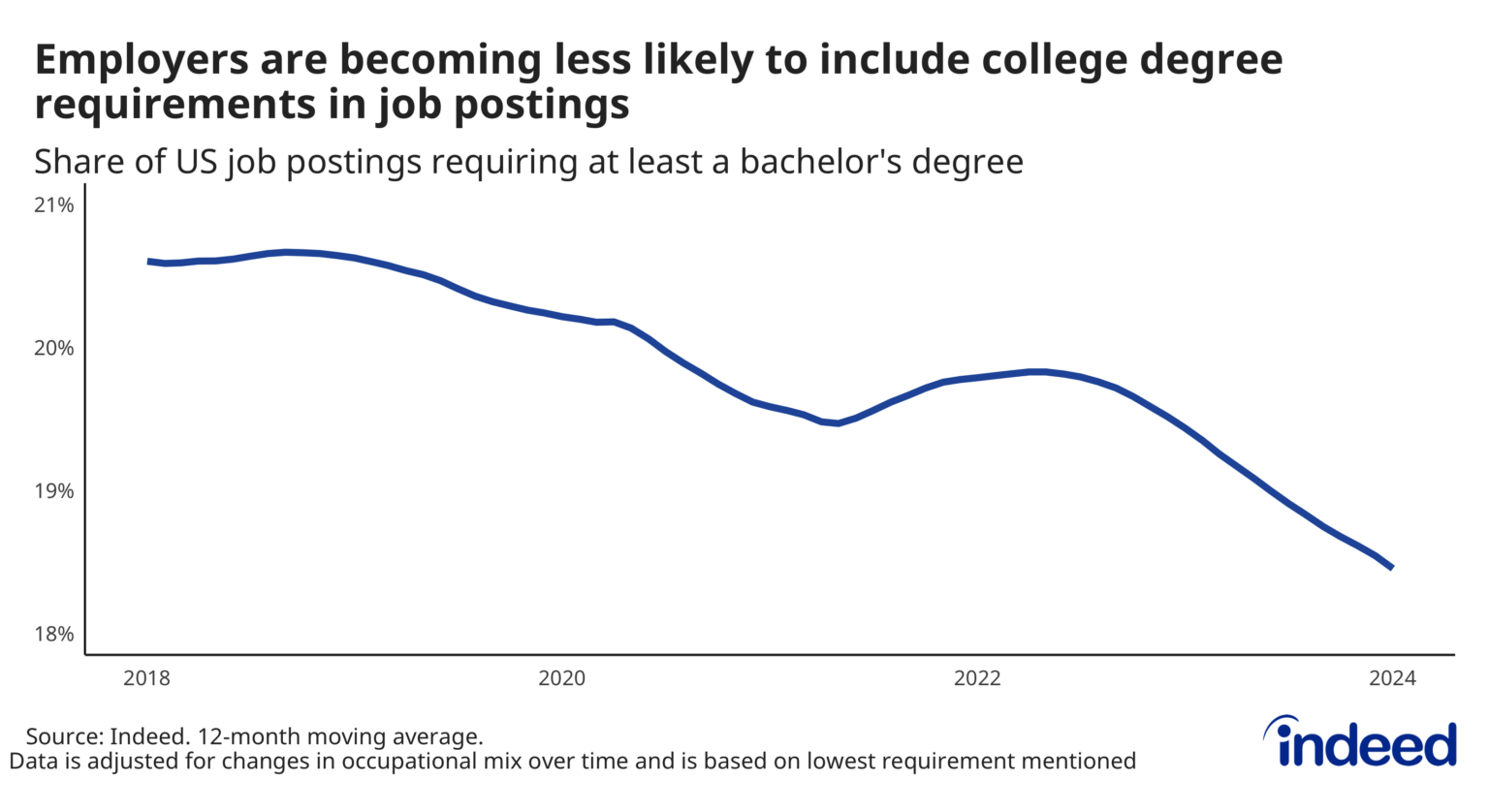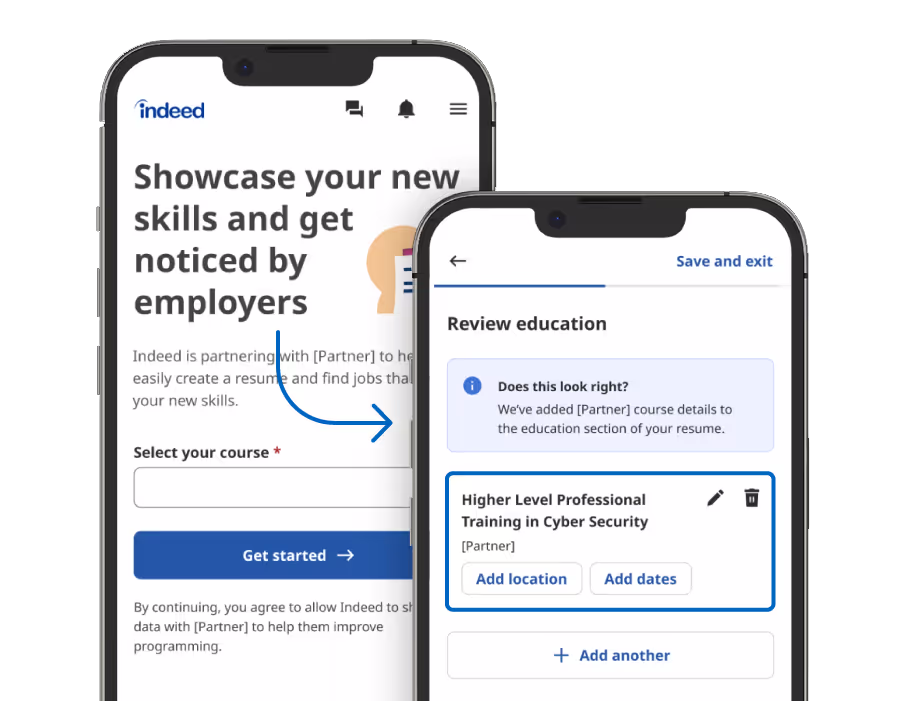Recruit Group is committed to helping 30 million people facing barriers in the labor market around the world get hired by FY2030, with one area of focus being reducing education barriers. Primarily through Indeed, we help job seekers without a college degree find work through platforms and partnerships. We spoke with Senior Vice President LaFawn Davis — who leads ESG (environmental, social and governance) initiatives at Indeed — about skills-first hiring, which is the key to this initiative.
Skills-First Hiring Attracts Attention as Labor Market Tightens
The only requirement to be hired for a job should be that you have the skills and abilities needed to do the work. However, bias and barriers in hiring make it harder for many job seekers to find, get and keep a job. One barrier is educational background. For example, the recruiting process automatically screens out millions of Americans when an employer requires a college degree. Indeed, which runs hiring marketplaces in over 60 countries, is determined to knock down this educational barrier, and the key to doing that is skills-first hiring.
“As the name suggests, skills-first hiring is a method of selecting candidates based on their skillset,” LaFawn explained. “Unlike the traditional selection method, which first ‘screens out’ candidates based on their academic background, skills-first hiring ‘screens in’ candidates first and evaluates their skills at an early stage. This allows employers to be more inclusive and still hire people with the right skills and abilities to perform their jobs, all in a shorter period of time.”
The global labor market has been tightening since the late 2010s, and there’s been a gradual trend among employers to prioritize hiring according to skills and abilities rather than educational background. Fewer employers now require a bachelor's degree*1, opening up fresh opportunities to previously overlooked job seekers.
*1 Source: Indeed Data

Employers are becoming less likely to include college degree requirements in job posting
Promoting Skills-First Hiring to Break Down Barriers
Even LaFawn, who now oversees ESG initiatives at Indeed, has experience with coming up against this barrier “I don't have a college degree, so I know firsthand what a huge barrier that can be when you’re looking for a job,” she recalls. “When the dot-com bubble burst in early 2000, I got laid off. Although I had rich operational experience and a solid skillset, I couldn’t get another job quickly because I didn’t have a college degree. I was a single mother with a small child; I lost my car and apartment, and had to move back home with my parents. About six months later, a friend of mine helped me get a job, but I went from making $90,000 annually to $11.75 an hour.
“The focus around job seekers facing barriers is therefore deeply personal to me,” she continues, “because I know what it’s like for something out of your control to stop you from getting something you’re qualified for. The number one thing we can do to help job seekers facing barriers, like me back then, is to promote skills-first hiring."

LaFawn Davis, Senior Vice President of ESG, Indeed
Indeed Products and Partnerships Power Skills-First Hiring
At Indeed, we advance skills-first hiring across the job market through our products and partnerships.
The Indeed platform uses search filters such as “No college diploma” and “No high school diploma” to make it easier for job seekers to find jobs without higher education requirements. In addition, we’ve stopped recommending education requirements as a screener question that employers populate when they post jobs. As a result, we are seeing more employers advertising jobs without an education requirement, and more job seekers applying.

Search filters to help job seekers find jobs without education requirement
Indeed offers a service called Skill Connect through one partnership arrangement. Job seekers who have completed vocational training programs that Indeed’s partner organizations provide can simply follow the dedicated resume creation process on Skill Connect and select skills and qualifications preset for each program. Their course history and skill information then appear on Indeed for companies to refer to, helping to match job seekers with companies looking for workers with their skills.

Skill Connect eliminates the manual process of converting job training curricula into skills that appear on Indeed Resumes
LaFawn adds that Indeed has established an internal taskforce, and its cross-company team has reviewed each job profile and removed college degree requirements from all those that Indeed posts except for positions where a degree was essential. This change affected 700+ job profiles — the vast majority of job profiles across all of Indeed’s business functions.
Skills-First Hiring Can Topple Other Barriers as Well
LaFawn ends by touching on other powers that skills-first hiring possesses. “A good number of hiring barriers — including education, criminal record, disabilities and military experience — should fall if we focus just on skills-first hiring. Even if you haven’t got a higher education or have a criminal record, it shouldn’t determine whether you’re hired or not.
“What matters is whether you’ve got the skills necessary for the job,” she continues. “Of course I want my lawyer to have a degree, and my doctor to have gone to medical school. Not all jobs need all of the things that job postings typically have, though. The same goes for job requirements other than higher education. We sometimes see inflated requirements. We will continue to provide support to ensure that employers recognize the skills they actually need and that job seekers figure out how to properly present the skills they possess.”

LaFawn Davis
Senior Vice President of ESG Indeed
LaFawn joined Indeed in 2019 after working at technology companies such as Google, Yahoo!, PayPal, and Twilio. As Senior Vice President of ESG, she leads Indeed’s internal teams working on sustainability, DEIB+ (diversity, equity, inclusion, and belonging), social impact, inclusive hiring services, and responsible AI. She also works as an external advisor and thought leader, and is a frequent speaker at events. LaFawn was named in Fortune magazine’s “World’s Most Powerful Women,” Entrepreneur magazine’s “World’s 100 Most Powerful Women,” Fast Company’s “Queer 50,” and the San Francisco Business Times’ “Most Influential Women in Business." She’s also an advisory board member for Lesbians Who Tech and Power to Fly, a limited partner at Operator Collective, an angel investor, and a fellow at the Black Venture Institute.